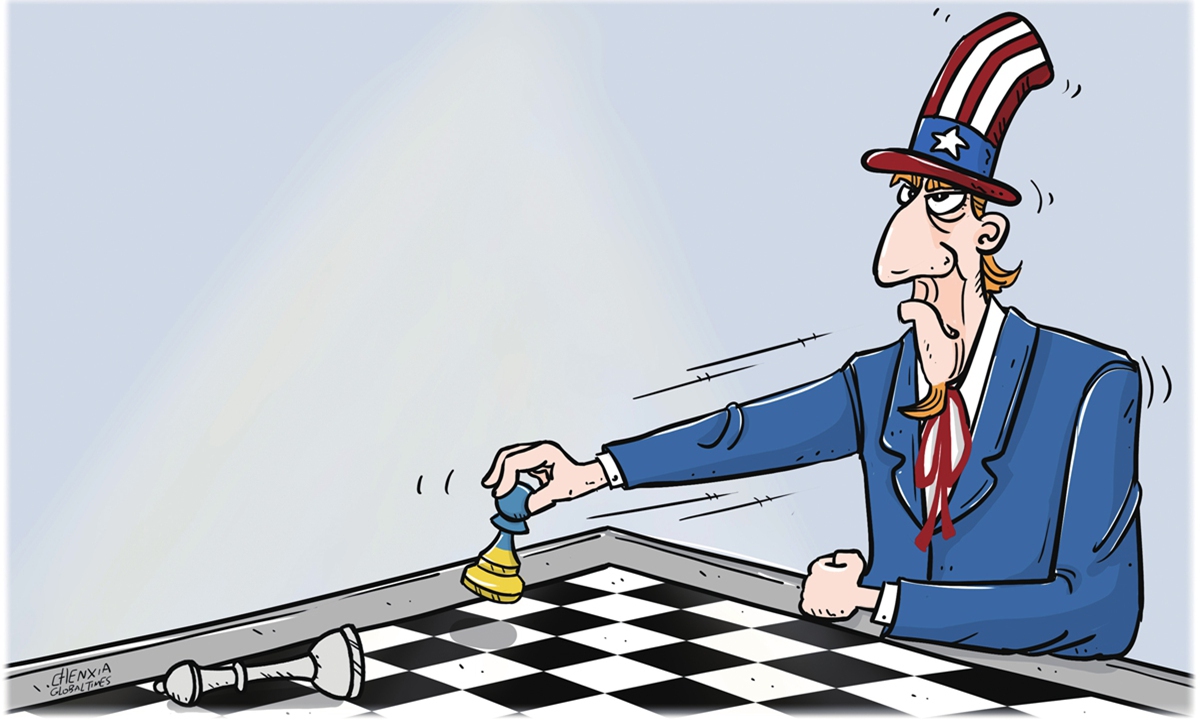
Illustration: Chen Xia/GT
The conflict between Russia and Ukraine continues. The US, which has been behind the crisis, seems to be toned-down recently. It is the US that has been encouraging Ukraine to get tough with Russia in the first place. Washington once articulated that "America's support for Ukraine's sovereignty and territorial integrity is unwavering." But the US has not delivered much of its previous promises. In fact, the US has realized its calculated goals when the conflict between Russia and Ukraine broke out.
The US aims to strengthen NATO at minimal cost and achieve a strategic containment against Russia. The US has never let go of its desire to contain Russia, and a major Eurasian country that is not under its control will always be on US "adversary list." After the Cold War, NATO, as a military organization to fight the Warsaw Pact, completed its mission. Its European members were much less motivated to invest too many resources. The US is urgently trying to pivot to the Asia-Pacific region but it doesn't want Russia's prowess to grow. This is the only way for it to fabricate a "security threat" to resurrect NATO and successfully withdraw from Europe, changing focus to China.
Meanwhile, the US still attempts to block Europe's strategic autonomy in its planning stage and incorporate the continent into US hegemony. According to US strategy, Europe has to serve US interests. As a result, European integration is encouraged to some extent, but the US still finds it necessary to control and divide Europe. Its support of Brexit follows this strategy. Europe, obviously hoping to avoid being sacrificed, wants to make choices according to its own interests, leading to the introduction of strategic autonomy, which is unacceptable for the US. After the breakout of the Russia-Ukraine conflict, Europe will once again be bound to US-led NATO.
The US is obviously playing a two-handed strategy in the Russia-Ukraine conflict, holding Russia with one hand and Europe with the other. Of course, US calculations don't stop at geopolitics. With the rising urgency of climate change, Europe, which already lacks energy, is in a critical period of transition, and Russia's oil and gas are crucial. Now that the Nord Stream 2 project has been halted due to the Russia-Ukraine conflict, and Europe has joined the US-led sanctions against Russia, it may have to seek more expensive liquefied petroleum gas from the US in the future.
The strategic selfishness of the US has brought more disasters to the world. It has seriously damaged trust between countries. The conflict between Russia and Ukraine is very complicated, but one of the most important factors at this point is that the US continues to exert maximum pressure on Russia, completely disregarding the promise that NATO would not expand eastward after the Cold War. Since then, Russia has repeatedly demanded a response to its security concerns, and the West has held a series of talks with Russia, but nothing fundamentally changed until Russia took drastic action. The reason that both a ceasefire and the peace talks are difficult is that the trust between Russia and Ukraine has been broken.
Obstacles now lie in the way of cooperation between China and Europe. When the US provokes China-Europe relations and requires Europe to join hands to deal with the so-called China challenge, the possibility that China-EU relations will be jeopardized by US factors will increase in the future.
The world will be more divided. Conflicts will eventually be eased and the flames of war will fade away. But the process will be painful and tortuous. The crisis provoked by the US has not only destroyed the peace of Europe, but also created confrontation among people. For example, Switzerland, which is a neutral country for centuries, now has joined in the sanctions against Russia. This makes people worry that the world is being divided into two parallel parts, namely the West and non-West.
One gains benefits but all of the others suffer losses. This is the consequence the US-created crisis will bring. It seems that the Russia-Ukraine conflicts are beneficial for the US to maintain its hegemony in the short term, but will eventually harm the US itself. In the era of globalization, people will inevitably move toward a community of a shared future. The selfish and short-sighted action of the US will only bring harm to the world and be eventually condemned by everyone.
The author is a professor at the School of International Relations of Beijing Foreign Studies University. opinion@globaltimes.com.cn




